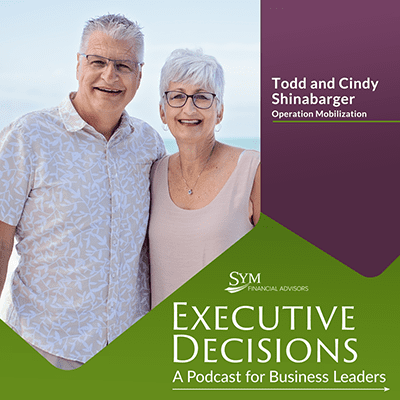Retirement Planning

Retirement Planning with SYM Financial Advisors
Retirement planning involves understanding your current financial situation and aligning it with your future goals. One must consider future income and expenses, investments, risks, Social Security benefits — and then make a plan that incorporates all those elements, plus several more, including taxes. Many individuals already take important steps (like contributing to a 401(k) and IRA) during their working years to build the foundation of a successful retirement.
Most times, simply having savings is not enough, and more planning is needed. We believe an individual or a family should work with a financial professional to create a comprehensive plan for funding a successful retirement that includes how to invest retirement assets and in what order to draw them down.

When is the best time to start retirement planning?
An old Chinese proverb tells us, “The best time to plant a tree was 20 years ago. The second-best time is today.”
That is also true about saving and investing for retirement. A great thing about today’s corporate environment is that companies often instruct young professionals to invest early, whether through a Target-Date Fund or other investment options, within a 401(k) account. Starting young is important.
The key is to build strong saving habits that will bear fruit over the lifetime. Saving for retirement is like building a snowman – the ball starts out small, then grows over time. Good habits will compound as years progress, improving your chances for a safe, secure, and rewarding retirement.
What are the steps in retirement planning?
Consider these key steps toward building a solid retirement plan.
Timing
Albert Einstein called compounding returns the eighth wonder of the world. The longer you can allow your investments to grow, the better shape you will be in when you blow out the candles on your retirement cake. But this doesn’t mean your wealth should be locked away. It is meant to be used before you retire as well and that is where financial planning can make an impactful difference.
Cash flow planning
A good cash flow plan measures the probability of your success by running 1,000 simulations of possible outcomes to give you a score. We feel its important to know the probability of success in each scenario that you discuss. Cash flow planning is just as important for short-term needs as it is for your long-term retirement needs. A solid plan will help maximize your investments and allow you to effectively use your assets in all stages of life for things like cars, homes, education, vacations, and big events to name a few.
Tax Planning
Taxes play a huge role in retirement planning. SYM Financial Advisors uses strategies to analyze your income today, project likely income in retirement, and best position your wealth in ways to minimize taxes so your wealth can grow as much as possible.
For many investors, the bulk of their retirement assets are in pre-tax accounts. Proactive tax planning accounts for those assets that will be taxed as income when they are distributed in retirement.
Risk Planning
SYM Financial Advisors can help you determine your ability and willingness to accept risk. When it comes to risk tolerance, we approach each client individually to uncover the balance right for them — typically through discovery conversations that are supplemented with risk assessment technology. We establish an Investment Policy Statement for your investments. For your life, SYM advisors help assess the coverage of contingencies you have in place and plan for healthcare.
Estate Planning
Building and protecting your wealth is paramount to ensuring a legacy within a family. Sharing your wealth with the people and causes you care most about in the manner in which you want them to receive it is part of the planning too. Changing estate tax legislation can provide challenges in preserving wealth. Working alongside an attorney, we help our clients safeguard their assets through careful planning.
Your Wealth Optimized
SYM takes a holistic approach to enable you to preserve, grow, protect, use, and share your assets optimally. Financial advisors at SYM understand that retirement planning is not static or linear work. It involves ongoing oversight of your investments and your financial plan, problem solving, and making adjustments along the way. With more than 55 years of experience, we know a thing or two about effective financial planning for retirement.
What types of retirement plans are there?
We mentioned that the investment universe is, well, expansive. The same is true of the array of account types someone may use to accumulate his or her retirement savings
401(k)
Most workers in America know about this employer-sponsored retirement account. An employee sets aside a portion of his/her pay-check before taxes and directs it into a 401(k)-retirement account. That money gets invested (typically in a mutual fund). What is great about the 401(k) is that it sometimes comes with free money through employer matching programs. That is a tremendous benefit that ensures that your retirement savings grow even before they get invested.
Solo 401(k)
Small business owners, namely sole proprietors, can take advantage of this often-overlooked retirement account. The Solo 401(k), or Individual 401(k), allows a business owner to contribute to a pre-tax account. It works similarly to a regular 401(k), although the maximum annual contribution is higher. SYM Financial Advisors can help small business owners optimise their retirement plans using this retirement saving strategy.
403(b)
Do you work for the government, a hospital, or a school? You might have access to a 403(b) account. A 403(b) works in similar fashion to a typical 401(k) in that you contribute pre-tax dollars, and then the assets grow tax-deferred until you begin distributions in retirement. The distributions are considered taxable income. Let SYM Financial Advisors help you avoid those pitfalls!
457(b)
A 457(b) is a plan type offered to some employees of government and non-government non-profits. What is exciting about a 457(b) plan is that you can have both a 403(b) and 457(b). That means you can contribute the annual maximum to BOTH accounts. If you can do that, you are officially a Super Saver (no, that’s not a technical term!)
IRA
An Individual Retirement Account (IRA) comes in pre-tax (traditional IRA) and after-tax (Roth IRA) forms. It takes some strategy to determine what contribution level and account type is right for your circumstance. SYM Financial Advisors can help you with this process.
Roth IRA
A Roth IRA, named after Senator William Roth of Delaware, is an IRA where you contribute after-tax money and then allow the investment to grow tax-free. It can be a great thing when used the right way. A Roth IRA also provides what we financial planning nerds call “tax diversification”. A good retirement plan manages and minimizes risk and having assets in pre-tax accounts like a 401(k) and after-tax accounts like the Roth IRA can help reduce tax-related risks.
SIMPLE IRA
A SIMPLE IRA(Savings Incentive Match Plan for Employees) is a small business retirement plan. It allows employees and employers to contribute to retirement without having to jump through all the legal hoops of establishing a more traditional 401(k) program.
SEP IRA
A SEP IRA (Simplified Employee Pension Plan) is another small business retirement plan that works like a Traditional IRA. A SEP IRA allows self-employed individuals and small business owners to access a tax-deferred retirement account at a low cost. It is one of the easiest small business retirement accounts to manage.
Last but not least, the HSA
A Health Savings Account (HSA) gets financial planners like us excited. This is the only account that features the ‘triple-tax advantage’ whereby, when used the most effective way, an investor can avoid paying taxes today, over time, and in the distribution phase. The trick is to save your qualifying health-related receipts during your life, then ‘reimburse’ yourself late in life.






